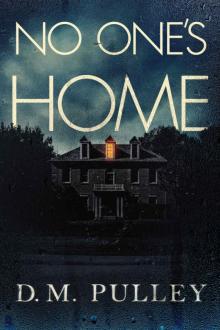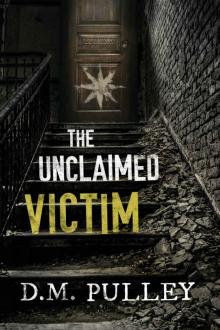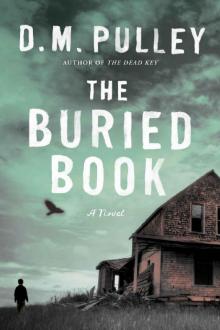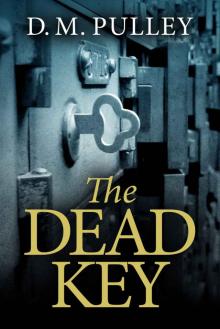- Home
- D. M. Pulley
No One's Home Page 9
No One's Home Read online
Page 9
“Hello?” he called out for the second time, forcing his voice above a whisper. He grimaced at the wimpy sound of it. I’m an idiot. Old houses creak. They settle. They groan. Right?
“Mom? Dad?” At the far end of the hall, the door to his parents’ suite stood open. The king-size bed was still made. The rest of the doors lining the hallway were shut.
A dull knocking sound snapped his head toward the back stairs. Then silence.
Hunter had half a mind to go back into his room and wedge a chair in front of the door. It wouldn’t be the first time he’d done it. The house had been giving him the willies ever since they’d moved in. His eyes darted from dark corner to dark corner. Something was watching him. Judging him. Hating him and his parents every time they hung a picture. He didn’t belong there in his sloppy T-shirt and boxers with his scrawny stork body and pimples. The house deserved better. It pined for an earlier time when servants had worn white gloves and lived in the attic.
Another footstep creaked somewhere up there, farther down the hall.
Back in his room, Hunter grabbed the souvenir Indians baseball bat his father had bought him as a bribe when they’d moved here. It had been autographed by the 1995 World Series runners-up, as if that would make him an instant Cleveland fan. Albert Belle. Sandy Alomar. Jim Thome. Kenny Lofton. Their sweeping pen strokes mocked him as he stood there in his underwear, scared of the dark.
The faint hint of a laugh came from somewhere above him. Hunter let out an involuntary hiss and backed away from the sound. One of the new air-conditioning vents his mother had installed hovered over his head. A scrawling white grate meant to look old fashioned covered the hole in his ceiling and, behind it, a menacing darkness.
“Hello?” he whispered at it, gripping the bat.
This is crazy, he told himself. I can either stand here like a pussy or go up there.
He marched back out into the hallway with the bat and rounded the corner to the servants’ stairs. Outside, a police siren went screaming down Lee Road toward the smaller houses on the other side of Chagrin.
With a slight wince he refused to acknowledge, he opened the attic door.
BeNNy KiLL. The words skittered across Hunter’s mind as he gazed up the attic stairs. A dim light filtered down the steep wooden stairs to where he stood. A bulb had been left burning somewhere in the attic again. Gripping the bat, Hunter climbed the creaking stairs.
“Hello?” he called into the stale air that grew warmer and heavier with each step. “Anybody there?”
The staircase led him up into the long cavern under the roof. The attic felt like a railway tunnel. The wood floorboards ran in crooked lines from the top of the stairs to the glowing white tiles of the bathroom, where a light had been left on.
Nothing moved.
Behind him, a window looked out into the darkness of the neighbor’s yard. Boxes had been stacked here and there, throwing long shadows on the walls. Sweat beaded up on his upper lip. It must have been ninety degrees up there. His mother hadn’t bothered piping the air-conditioning to the third floor. They certainly didn’t need the room.
Hunter took a tentative step toward the bathroom. The floorboards creaked under his feet. He scanned the boxes to his left. To his right, a bedroom door stood open and dark. A nagging sensation crept up his back. Who’s there?
He walked over to it and felt inside the wall until he found the light switch. His father had piled boxes of Christmas decorations into the corner. The one window was too small to even fit a box fan. A narrow door to a tiny closet stood open, showing two rusting metal hooks inside.
Someone was watching him.
He spun around to face the main room only to see the moving boxes and the half-size doors along the opposite wall. He’d never opened one to peer into the unfinished crawl space. He could imagine what was there—insulation, air handlers, ducts, spiders, bats, mice . . . ghosts. He shuddered, debating whether he had the guts to really find out.
Nope.
Instead, he focused on the boxes and flipped one open to find the comic books that had gone missing during the move. He rifled through his lost treasures. “Dammit, Mom!” he muttered. She’d probably been overjoyed when he couldn’t find them. Aren’t you getting a little old for those things, honey? The undertone of motherly concern and female revulsion in her voice said, You’re not going to be one of those sexually frustrated nerds that goes crazy one day and shoots up a school, are you?
Still gripping the bat, he turned back to the offending light in the bathroom. A tiny fly buzzed lazily past the open door. Hunter crept closer to it, his mother’s voice still ringing in his ears. Hunter! Did you leave the attic light on again? He frowned at the naked bulb protruding from the antique fixture over the sink.
He scanned the hexagonal floor tiles, the long crack running down the middle of the floor, the claw-foot tub, the porcelain sink with two water spouts. Tiny dead flies collected in piles inside the tub and around the rusted drain of the sink. They were shaped like little black hearts. One flitted under the hot light bulb. Another rested on the wall, watching.
A wooden medicine cabinet had been built into the wall over the sink. Hunter looked back at himself through its clouded silver mirror. His shaggy blond hair needed to be cut. Patches of facial hair along his jaw formed a broken attempt at a beard that wouldn’t fill in for years. His eyes sat a hair too close to his big, crooked nose. Acne medication had left his skin dry and scaly.
Hunter dropped his eyes from the mirror and studied the tiles under his bare feet with growing revulsion. Dead heart-shaped flies were scattered over the grimy floor, and the grout lines varied from dull gray to patches of sticky black. A film of dust blanketed the corners. A half-used roll of toilet paper perched on the windowsill. A shallow puddle of rusty water sat inside the stained porcelain toilet bowl.
Grimacing, he turned back to the medicine cabinet and reached for the handle, not sure he wanted to see what lay inside.
The faint ring of a telephone stopped him. The house phone? Hunter stepped back out into the main cavern and listened as the trilling sound came again from the floor below. His parents had insisted on installing a landline for “emergencies,” although Hunter couldn’t remember ever hearing the thing ring. He didn’t even know the number. Who calls a landline? he wondered. And at what, one thirty in the morning?
Maybe there was some sort of emergency. His cell phone ringer was off, and it was sitting on its charger in his room. What if his parents were trying to reach him? What if something had happened?
By the time he reached the antique rotary phone in his parents’ bedroom, he was running. He snatched it up on the sixth ring. “Hello?” he said urgently. “Hello? Anybody there?”
No one answered.
“Hello?” He stood there gaping at the handset a moment.
The air shifted somewhere behind him. Hunter spun around, brandishing the handset like a small club. The hallway stood empty from one end of the house all the way to the servants’ stairs at the other. Still, a shiver prickled up his arms.
He hung up the phone and realized he was still holding his bat. Ten steps down the hall, he stopped at the top of the monumental staircase and listened. The muffled sound of feet on carpet seemed to be coming up from somewhere below. The living room?
He had taken two timid steps down the stairs when the sudden whir of the garage door climbing up its track stopped him cold. Shit. The last thing he wanted was for his parents to catch him ghost hunting in the middle of the night with a baseball bat. He knew what they would think. He lit back up the stairs to his bedroom and snapped off his reading light.
Two minutes later, his mom and dad spilled into the kitchen, decibels louder than any phantom.
“Oh, fuck him if he can’t take a joke. How many tedious golf stories can one woman take? I ask you.” His mother laughed obnoxiously, the sound spilling across the kitchen floor and fading into the wood of the den. “Hon, did you leave the TV on in here?”
/>
Hunter sat up in his bed and stared at the door. He hadn’t been anywhere but the kitchen since they’d left.
“No. I can’t say I did. Do you really need another drink?”
Ice clinked into glass. “For chrissake . . . do you think he got into the scotch? Will you talk to him, hon? He sure as hell won’t talk to me. It’s like he hates me.”
“Don’t be silly. He’s a teenager. All teenagers find their parents annoying. Okay? C’mon . . . no more vodka. Let’s get you to bed.”
“You’re no fun anymore, Myron. When did you stop being fun?” A glass slapped down onto a half-finished marble counter.
“And this is fun? Enough. Come upstairs with me, and we’ll have some fun. Okay?”
“Mmmm . . . what kind of fun?” They shared a muffled exchange while Hunter grimaced in the dark. Footsteps stumbled up the back steps, and Margot murmured something.
“Shh . . . he’s sleeping.”
Hunter watched the shadows of their feet pass by in the sliver of light beneath his bedroom door. A minute later, the hall went dark.
16
The Klussman Family
September 14, 1990
Staring out at the sidewalk from his second story window, Benny Klussman sat in his usual spot, rocking back and forth in his chair. Back and forth. Back and forth. On the other side of the glass, the cars moved with him, back and forth down Lee Road. Red and shiny. Dull and black. White and dirty. A yellow one made him sit up straighter. He followed it with his eyes all the way across South Woodland and out of his windowpane. Yellow. That was unusual.
There were fewer cars that morning. Not as few as on a Sunday. But fewer. A dozen or two less than normal. He double-checked the calendar hanging from his wall. Friday, September 14, 1990. He checked it again. Friday. The digital clock next to his bed read 7:16 a.m. It was seventy-five seconds fast compared to the watch on his wrist but was close enough. The morning rush should be as expected. He checked the calendar again, noting Rosh Hashanah wasn’t until next Thursday. He didn’t know what those words meant, just that special days on the calendar affected the traffic out his window.
He snapped his calculating eyes back to the road and watched for his regulars. White Honda with lady putting on lipstick was three minutes late and counting. Green Jaguar with angry man should’ve passed six minutes ago. Something was wrong. He began to count cars again. Forty. Forty-one. Forty-two. He checked his watch. Forty-two in sixty seconds wasn’t enough. It wasn’t enough for a Friday. Is there an accident somewhere? He traced the sky for signs of smoke. The uneasy feeling crept into the fists clenched like vises in his lap, making them want to move. To hit.
His mother hated his fists. They gripped together harder.
Benny knew he wasn’t like other boys. He would never grow up and move away from home, no matter how hard he wished he might. At twenty-four years old, he couldn’t tie his own shoes. He needed Velcro, and sometimes he needed help working the straps when his fingers curled into his wrists like claws and wouldn’t do what they were supposed to do.
Out on the sidewalk, the brown-skinned ladies were walking to the bus. Only seven today. Yesterday it was nine. The day before it was ten. Where did they go? The other three ladies? One with the flowered purse, the other with the plastic shopping bag, the third with the glittery hat. Where are they?
The pack of boys heading to the high school from south of Chagrin Boulevard walked under his window two minutes late. Three baseball hats. Not four. Nine boys, not eleven. Something was wrong.
Benny turned to the maps his mother had taped to his wall. She’d finally gotten the one he really wanted. The one of Shaker Heights that matched the words marked on the mail labels that would come to their house: “14895 Lee Road, Shaker Heights, Ohio.” Back when she’d let him sort the mail. Back before the hospital.
It had taken a long time for her to figure it out. Hours of staring at maps in books. Pointing. Smiling. Quiet. Happy. Mesmerized. I don’t know. He just loves maps! Maybe it’s the colors.
He stared at his map of Shaker Heights, eyeing the roads. Counting the streets. Could the missing boys have gone a different way? He squinted at the words, only recognizing some. His mother had put a big red star on it and said, Look. There we are. This is our house, Benny. And here’s our street. Lee Road. And there’s the library and there’s the grocery store and the gas station . . .
She never pointed out a school. They’d tried going to school many, many years earlier when Benny was very small. It had only made things worse. He’d come home with bruises, his muscles tensed up hard as wood and the look of a caged animal. His mother would spend hours yelling into the phone and even more hours crying behind a closed door. Benny hated school.
But he’d loved his backpack. There had been a big red truck on the front, and it had been filled with paper and crayons and his favorite toy cars. He’d insisted on wearing it every time he’d left the house until it had no longer fit. He watched the larger backpacks on the boys’ shoulders outside his window. No trucks. But he knew they were going to school. Only some weren’t today.
Only thirty-two cars passed in the next minute, and his fists had wound themselves into hard knots. They started to pound his leg.
He yelled at them in his head. Only it was her voice yelling. Just RELAX! Count to ten, nice and slow. One, two . . . Let go, baby. LET GO! Her eyes would be screaming what her mouth wouldn’t say: Jesus, what is WRONG with you?
Her voice pleading in his head felt like stabbing knives. Even though he knew she meant well, her voice dripped with helplessness and desperation and sorrow and anger and all the hate love could bring. It wouldn’t stop. He tried to overpower the thought of her with his own mangled voice that he rarely heard come out of his mouth correctly. SHUT UP! SHUT UP! SHUT UP! “SHUUU—”
“Benny!” his mother gasped from the doorway, but only the watcher in the corner of his mind could hear it. The watcher heard and saw everything, always lurking over his shoulder, but it could never control his hands, his mouth, his body. It could only light a desperate spark behind his eyes. It could only whisper in his ear. She’s coming.
His mother’s hands fought to catch his fists. They were pounding, pounding, pounding his head. SHUT UP! The watcher curled up beside him, not wanting to see but unable to stop seeing. The watcher had no eyelids. No hands. No mouth. Just eyes to see and ears that heard everything.
“Benny! No. NO!” His mother caught his wrists and pressed all the weight of her 160-pound body against his arms to keep them down, to keep them from hitting her too. A dull pain beat in his head almost loud enough to stop the voices. But not loud enough. He knocked his head against the floor. Shut up! SHUT UP!
“Honey, stop! BILL! I need HELP!” The panic in his mother’s voice made him pound his head harder. No, Mommy. No. Don’t hate me. Don’t—
He writhed to get her off him, away from him. The watcher sat in his corner helplessly recording it all. The way Benny’s fist caught his mother in the chin. The way she recoiled from him in terror, backing away. Away. Away. The animal shrill in her voice as she shrieked, “BILL!”
Before his fists and feet could find themselves another target, a thick arm wrapped around his neck from behind, holding him in a vise. Bill.
“Now, Benny, we’re gonna settle down, alright? You hear me?” The giant dark-skinned man squeezed his throat a little harder. Benny felt his fists slowly give up as the oxygen drained from his head. Bill weighed over three hundred pounds. Bill was paid by the state of Ohio to help his mother keep Benny. If Benny didn’t behave, they’d take him away again. Away from his window. Away from Rawlingswood forever.
“Good man,” Bill said, but he didn’t let go. Instead, he made some secret gesture to his mother that even the watcher couldn’t see.
Benny’s mother nodded and stood up on wobbly legs. She left the room.
Wait, Benny tried to say, even though his words never came out as more than a groan. A drowning creature’
s voice. “Waa!”
He didn’t want the needle, but the needle was coming. He wanted to ask about his road outside, about his cars and his people. Why are they late? Is there construction on the road somewhere? Are they okay?
“Easy, Benny. That’s right. You know the rules.” Bill had loosened the grip on his neck and hauled Benny up into a sitting position on the floor. Out the window, all Benny could see was sky. He was too low to see the road. He tried to get up, but Bill held him fast. “We don’t have to do this every time, Benny. You know what to do.”
And he did know. He knew from all the times at the hospital and all the home visits. The doctors and nurses and social workers would study him with veterinarian eyes, talking in slow, stupid words. When Benny mad, Benny squeeze the balloon . . . Benny breathe like this . . . Benny count to ten. You know ten?
They didn’t know how much he could understand them, because Benny could never make his mouth say the words, so they figured he was stupid. Some even figured he might be deaf. He liked those ones the best because they talked to each other in front of him like he couldn’t hear. Like he wasn’t there. Cerebral palsy. Nonverbal. Unknown mental capacity. Dystonia. Seizures. Spasticity. Medication. Institutionalization. Incompetence. Permanent guardianship. Severe autism?
If he behaved himself, he was allowed to live at home. Bill was explaining this fact to him again. Bill always talked to Benny like he was a person. It made it harder sometimes. It made Benny notice how everyone else didn’t. Not even his mother, even though the watcher whispered in his ear that she wanted nothing more than for Benny to be a person. The watcher saw how sad her eyes looked and the way her skin sagged gray and heavy whenever she talked to him. The watcher knew the way his father had left five years ago, even though she’d never tried to tell him.

 No One's Home
No One's Home The Unclaimed Victim
The Unclaimed Victim The Buried Book
The Buried Book The Dead Key
The Dead Key